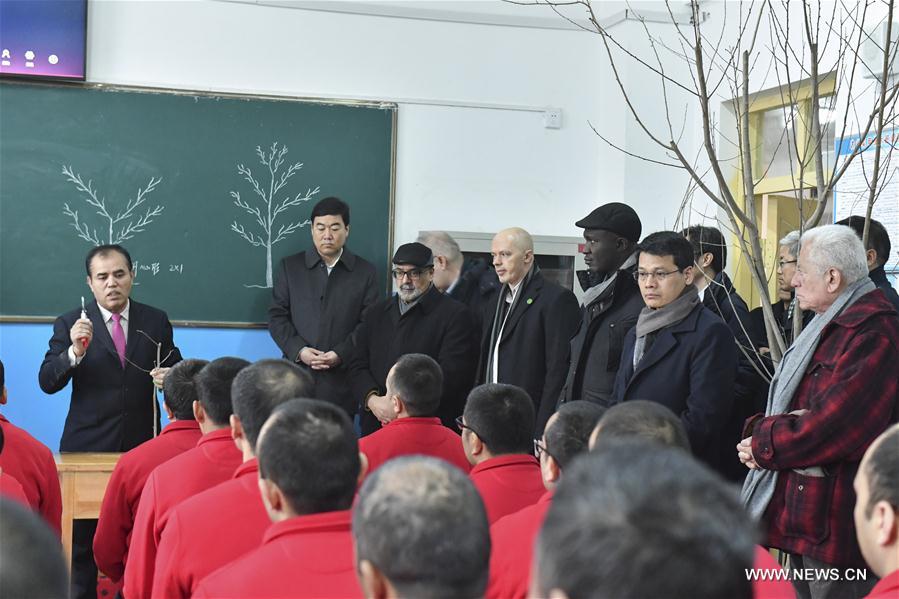
Delegates from permanent missions of eight countries to the United Nations Office at Geneva visit a planting and farming class at the vocational education and training center in Moyu County of Hotan Prefecture, northwest China's Xinjiang Uygur Autonomous Region, Feb. 18, 2019. (Xinhua/Ma Kai)
BEIJING, March 18 (Xinhua) -- China on Monday issued a white paper, saying that the country gives top priority to a preventive counterterrorism approach.
Based on experience learned from the international community, China has been active in implementing the resolution of the United Nations General Assembly concerning the United Nations Global Counter-Terrorism Strategy (60/288), and has been working hard to wipe out the conditions conducive to the spread of terrorism and to prevent and combat terrorism.
"Education and training centers have been established with the goal of educating and rehabilitating people guilty of minor crimes or law-breaking and eradicating the influence of terrorism and extremism, in order to prevent them from falling victim to terrorism and extremism, and to nip terrorist activities in the bud," said the white paper, titled "The Fight Against Terrorism and Extremism and Human Rights Protection in Xinjiang."
IN ACCORDANCE WITH LAW
Education and training centers are institutions established in accordance with the law. They have clear goals and methods of training, criteria for program completion, and methods of assessment, which are stated in the agreements they signed with trainees, the white paper said.
According to the white paper, at present, the trainees at the centers fall into three categories:
-- People who were incited, coerced or induced into participating in terrorist or extremist activities, or people who participated in terrorist or extremist activities in circumstances that were not serious enough to constitute a crime;
-- People who were incited, coerced or induced into participating in terrorist or extremist activities, or people who participated in terrorist or extremist activities that posed a real danger but did not cause actual harm, whose subjective culpability was not deep, who made confessions of their crimes and were contrite about their past actions and thus can be exempted from punishment in accordance with the law, and who have demonstrated the willingness to receive training;
-- People who were convicted and received prison sentence for terrorist or extremist crimes and after serving their sentences, have been assessed as still posing potential threats to society, and who have been ordered by people's courts to receive education at the centers in accordance with the law.
Through education and training, the trainees have broadened their channels to acquire modern knowledge and information, the white paper said.
It also said that through study, the trainees have realized that as citizens they have an obligation to abide by the Constitution and laws of the state and they should conduct themselves in accordance with the rights and obligations endowed to them by the Constitution and laws.
In view of the fact that some trainees lack vocational skills and have difficulties finding employment, the centers set up training programs in the making of garments, footwear and hats, food processing, assembly of electronic products, typesetting and printing, cosmetology and hairdressing, e-business, and other courses.
Through training, trainees have gained rudimentary vocational skills, and some of them have completed their study at the centers and found jobs, the white paper said.
It also noted that trainees can have home visits on a regular basis and can ask for leave to attend to private affairs.
The centers fully respect and protect the customs and habits of trainees of different ethnic groups, care for their mental health, offer psychological counseling services, and help them solve real-life problems.
Dignity, freedom, ethnic customs and religious beliefs are fully guaranteed for trainees at vocational education and training centers in Xinjiang, said Shohrat Zakir, chairman of the government of Xinjiang Uygur Autonomous Region, last week while attending an open-door discussion of the Xinjiang delegation to the second session of the 13th National People's Congress in Beijing.
"Trainees gained law awareness, enhanced professional skills and got rid of extremist thoughts, which is conducive to their return to a normal and better-off life," Shohrat said.
IN THE INTERESTS OF PEACE
A country under the rule of law, China respects and protects human rights in accordance with the principles of its Constitution, the white paper said.
The Chinese government stands firmly against all forms of terrorism and extremism, and is relentless in striking hard, in accordance with the law, at any conduct advocating terrorism and extremism and any action that involves organizing, planning and carrying out terrorist activities, or infringing upon citizens' human rights, the document said.
For some time China's Xinjiang, under the combined influence of separatists, religious extremists and terrorists, has seen frequent incidents of terrorist attacks, which have been detrimental to the life and property of people of all ethnic groups in Xinjiang and have trampled on people's dignity.
In the face of these real threats, Xinjiang has taken resolute action to fight terrorism and extremism in accordance with the law, effectively curbing the frequent occurrences of terrorist activities and ensuring, to the maximum extent, the rights to life and development of people of all ethnic groups in Xinjiang, the document said.
The white paper also noted that China has been active in international exchanges and cooperation in counterterrorism.
In today's world, faced with the severe challenges of terrorism and extremism, no country can shy away from them, it said.
"Only by strengthening our community of shared future, abandoning double standards, enhancing political mutual trust, reaching strategic consensus, and promoting exchanges and cooperation, can we effectively curb and combat terrorism and extremism in the interests of world peace and stability," the white paper said.



